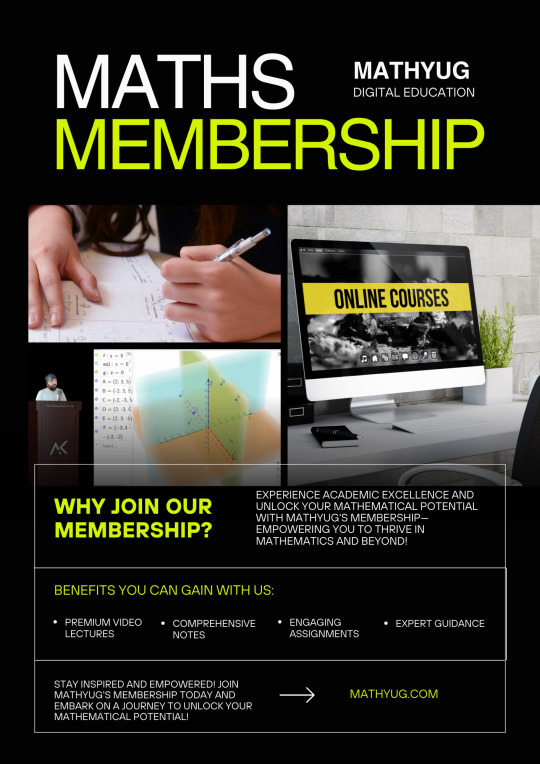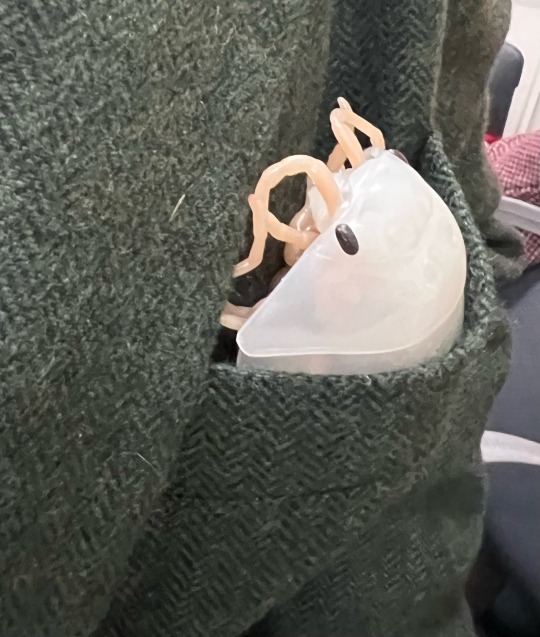#mathematics education
Text
If I ever end up as a professor in a mathematics department, I'm going to make a point of telling my students they can bring a ruler to my final exams. Real analysis? You are allowed to bring a ruler. Commutative algebra? You are allowed to bring a ruler. Number theory? You are allowed to bring a ruler.
279 notes
·
View notes
Text
I don't think we should stop teaching kids things like long multiplication/division because there is value in being able to manipulate numbers and correctly carry out an algorithmic process, but I do think we spend way more time on it than we should (at least at my school).
I hate to sound like the 'we basically always have a calculator so what's the point?' complainer kid, but... we very much do have access to a calculator most of the time. So I think kids would benefit from less time cranking out arithmetic problems and more time:
Practising good calculator use
Learning to use things like estimation, inverse calculations, parity, and check digits to spot a wrong answer
Looking at a problem and figuring out which sums to do (we already do this, but there should be more of it and calculator use should be allowed more often)
This is more for younger kids, but taking the time to make sure they understand exactly what each operation actually means (this will make the above point easier because a sentence about sharing something out between different people will scream 'division')
Learning more about the properties of the different operations (which are commutative and which aren't, which are inverses of each other - maybe things like being able to cancel factors before you divide or how multiplying by a and then by b is the same as multiplying by ab, but I know some kids who would really struggle with that)
Problem solving and logical thinking
There's way more, but anyway I think it's less important for a kid to be able to do, say, 34 x 59 by hand than it is for them to be able to recognise something like 93 (accidentally pressing + instead of x) or 3105 (pressing 5 before x instead of after) as a wrong answer.
#probably preaching to the converted here#but once you've learnt the basic operations you should be allowed to let computers do the grunt work#organic home grown content#mathematics#education#mathematics education#i'm at the pizza hut i'm at the taco bell...#100 tier
138 notes
·
View notes
Text

MathYug Launches Innovative Mathematics Memberships, Revolutionizing Online Learning Experience. Empowerment, Expert Guidance, and Academic Excellence at the Forefront.
https://mathyug.com
#mathyug#mathematics education#online learning#math skills#academic excellence#mathematics memberships#student success#mathematics support#student support
0 notes
Text
positivist and postmodernist epistemology in mathematics teaching and learning
a researcher’s own epistemic consciousness influences their body of work and their research metatheory. it impacts the decision-making process involved in undertaking research, its methodology, methods, discussions, and conclusions.
for example, a positivist approach to studying calculus learning would presume that the classroom or a calculus course is a closed system, bounded by what happens in it without considering indirect factors which may affect calculus teaching and learning. a calculus student would be considered as a passive learner, a sponge absorbing the lecture. to a positivist, a probable cause of a student’s failure in first-year calculus could simply be the student’s inadequate preparation for the graded assessments in the course, without even considering the causes for this condition. in fact, even considering this metatheoretical discussion is “allegedly useless and sterile” to a positivist; positivists just do research mostly employing quantitative methods (sousa, 2010, p. 464).
on the extreme end of epistemological spectrum lies postmodernism, a rebuke to positivism. it argues that the truth of a claim is relative to agreement, negotiation, and consensus (sousa, 2010, p. 471). a researcher employing this relativist paradigm would use qualitative research techniques, “probably an instinctive reaction” to the positivist preference of quantitative methods. any research grounded in postmodernist epistemology would just be a report of the interviews made during the process and take it as fact.
a delicate balance between positivism and postmodernism is accorded to researchers in mathematics education by critical realism.
0 notes
Text
Understanding Mathematics
Photo by Artturi Jalli on Unsplas
I grew up absolutely hating mathematics but here I am, 10 years later, trying to get through an undergraduate degree in Mathematics. My love for maths started in my English literature class. Funny enough, they are very opposing fields of study. I knew I was not good with words. In my head, if people could create wonders with the same 26 alphabets, then the same…

View On WordPress
0 notes
Text
sejak senin, 6 februari 2023 kemarin, saya bersama teman-teman fakultas saya (ni kadek ayu indah mahandari-pendidikan matematika, ni putu maryati saputri-pendidikan bahasa inggris, dan maharani nur rahma-pendidikan bahasa inggris) menjalani sep (school experience program) di sma perguruan cikini duren tiga. sep sendiri sebenarnya lebih umum dikenal sebagai ppl (praktek kerja lapangan) jika di kampus lain.
alhamdulilah lokasinya tidak terlalu jauh dari kos sehingga saya bisa jalan kaki. teman-teman saya kadang ikut jalan kaki kadamg membawa motor, naik ojek online, ataupun naik bis transjakarta.
masih kurang banyak hari lagi untuk kami menjalani sep terakhir di tahun terakhir ini. 2 bulan, cuy. seharusnya dalam timeline selesainya april, tetapi tidak tahu jika di perpanjang. doakan kami bisa memberikan yang terbaik untuk diri kami dan almamater kami ya!✨



#education#ceritasep#schoolexperienceprogram#smapercik#smapercikdurentiga#ppl#mathematics education#pendidikanmatematika
0 notes
Text
How to solve linear equations
What is a linear equation?
Answer:- An equation which has one or two variables and highest power of the variables are one and when plotted on the graph forms a straight line is called a linear equation. e.g; 3x +2y = 0 is a linear equation of two variables, where x, y are two variables.
again,ax + 5 = 0 is a linear equation of one / single variable of x.

To Read more.....
#mathematiques#mathematics journal#mathematics class#mathematics tour#mathematics project#mathematics#mathematics assignment#mathematics education#mathematics text book#mathematics day#mathematics teacher
0 notes
Text
Anyone know some cool calculus level theorems, on the level of the intermediate value theorem and stuff like that, which is not generally covered in standard textbooks but probably should be? More generally, what could be done to advance the standard undergraduate repertoire of mathematics?
3 notes
·
View notes
Text
Mathematics 🤔
#pay attention#educate yourselves#educate yourself#knowledge is power#reeducate yourself#reeducate yourselves#think about it#think for yourselves#think for yourself#do your homework#do some research#do your own research#question everything#ask yourself questions#mathematics#math#teach right#school system#educational system
1K notes
·
View notes
Text
Man i wanna study everything and nothing at the same time like god gimme the strength of chosing a career path ffs
There is psychology and then there is navy and im already a diploma deep into the education field also i wanna be a tech genie and a creative af person somebody kill the perfectionist inside me so that ill stop expecting to build a career in every hobby of mine from myself without exploring anything 😀
#neeks rambling 🍫#thoughts 💭#i wanna study a lot#knowledge#space#ocean#chess#mathematics#sea#education#psychology#dance#technology#navy
269 notes
·
View notes
Text

no it is not “junk”
i need all of these to do my job!
YES even the plastic isopod. (his name is TIMOTHY, OK?)
Timothy is critical to my lesson planning process.


#education#isopod#desk#work#joyful clutter#things that make me happy#mathematics#math jokes#teaching#school#silly life#bugs#bugblr#insects#invertebrates#cute
344 notes
·
View notes
Text
“Everyone knows that something is wrong. The politicians say, ‘we need higher standards.’ The schools say, ‘we need more money and equipment.’ Educators say one thing, and teachers say another. They are all wrong.
The only people who understand what is going on are the ones most often blamed and least often heard: the students. They say, ‘math class is stupid and boring,’ and they are right.“
-Paul Lockhart, A Mathematician's Lament
1K notes
·
View notes
Text
Theorem: Mathematicians should start using a little sunglasses emoji at the end of proofs instead of a square
Proof: It would be badassery and coolsauce.
😎
102 notes
·
View notes
Text

Happy Pi Day 2023!
#mysteriousquantumphysics#pi day#pi#math#physics#physicsblr#studyblr#education#science#mathematics#quantum science
432 notes
·
View notes
Text
Listen, textbook, I admire the dedication to grifting my students into learning most of Constructive Logic before they've realized it. They are computer scientists after all. It's good for them. But... really? No explanation of formal proofs by contradiction in the undergraduate, Logic for CS textbook? You do include double negation elimination, which is an equivalent Classical axiom, but not, like, (A -> Bottom) -> ~A?
You mean I'm gonna have to derive that myself from the completely random and arbitrary Classical axioms you've decided to adopt and then neglected to prove the completeness of? Otherwise, all of these proofs will become extremely cumbersome and all of my students will swear off CS theory for the rest of their lives?
... ok fine, it'll be in the slides. T-T
47 notes
·
View notes
Text
The next textbook author who writes a proof longer than 3 nontrivial sentences and does not sketch the structure of the proof in advance, I'll fucking strangle.
You are not here to discharge your obligations to a proof checker! You are here to impart the ability to generate this bullshit! Separate your proof steps! Name techniques you used to produce these and intuitions that let you guess they'd be helpful! Learn how to write a memorable narrative, you fuckhead!
#i might be an entitled brat who wants to learn math with as little thinking as possible AND I AM RIGHT#my issues with mathematical education let me show you these#math#posts#ranty
85 notes
·
View notes